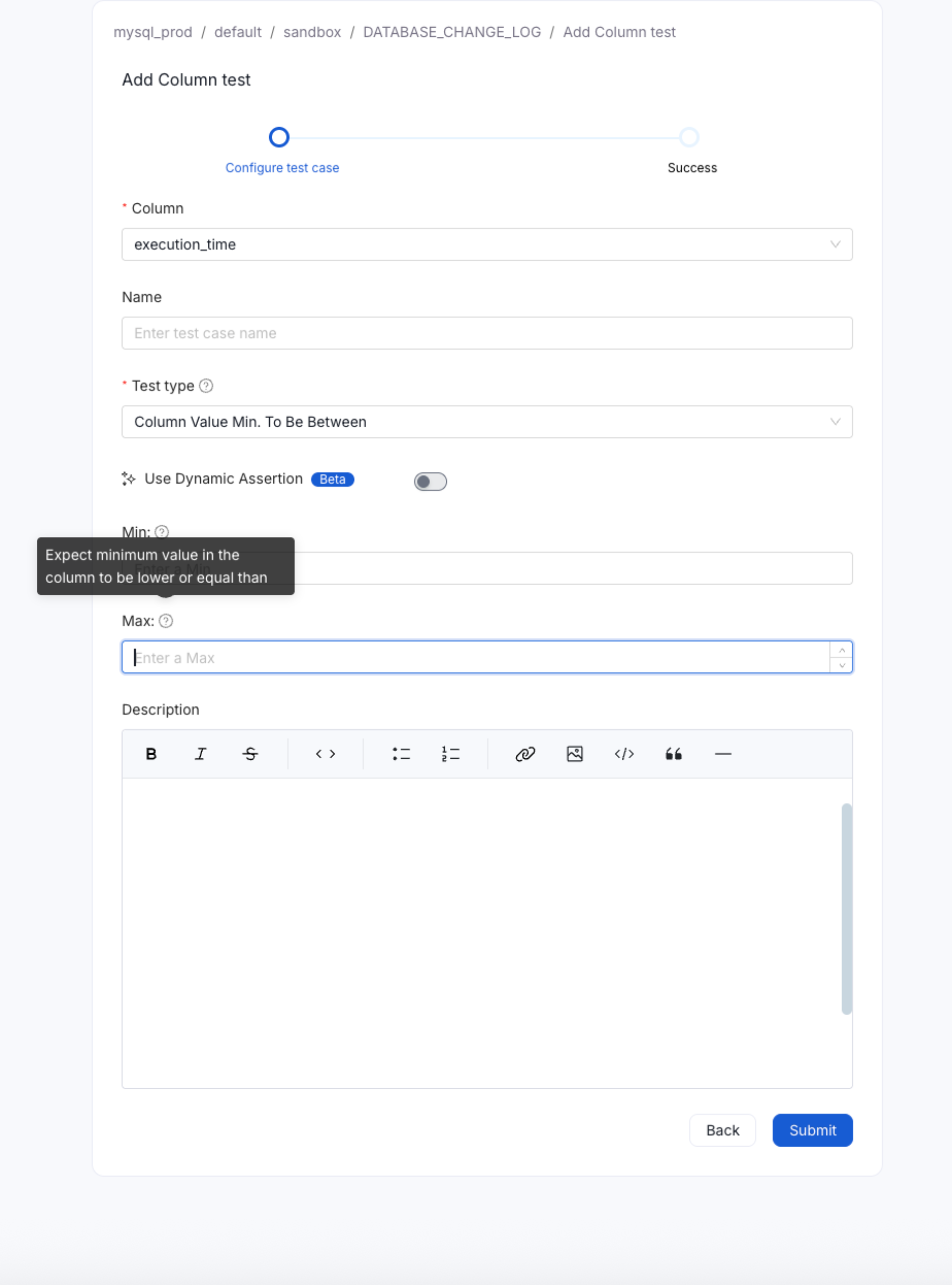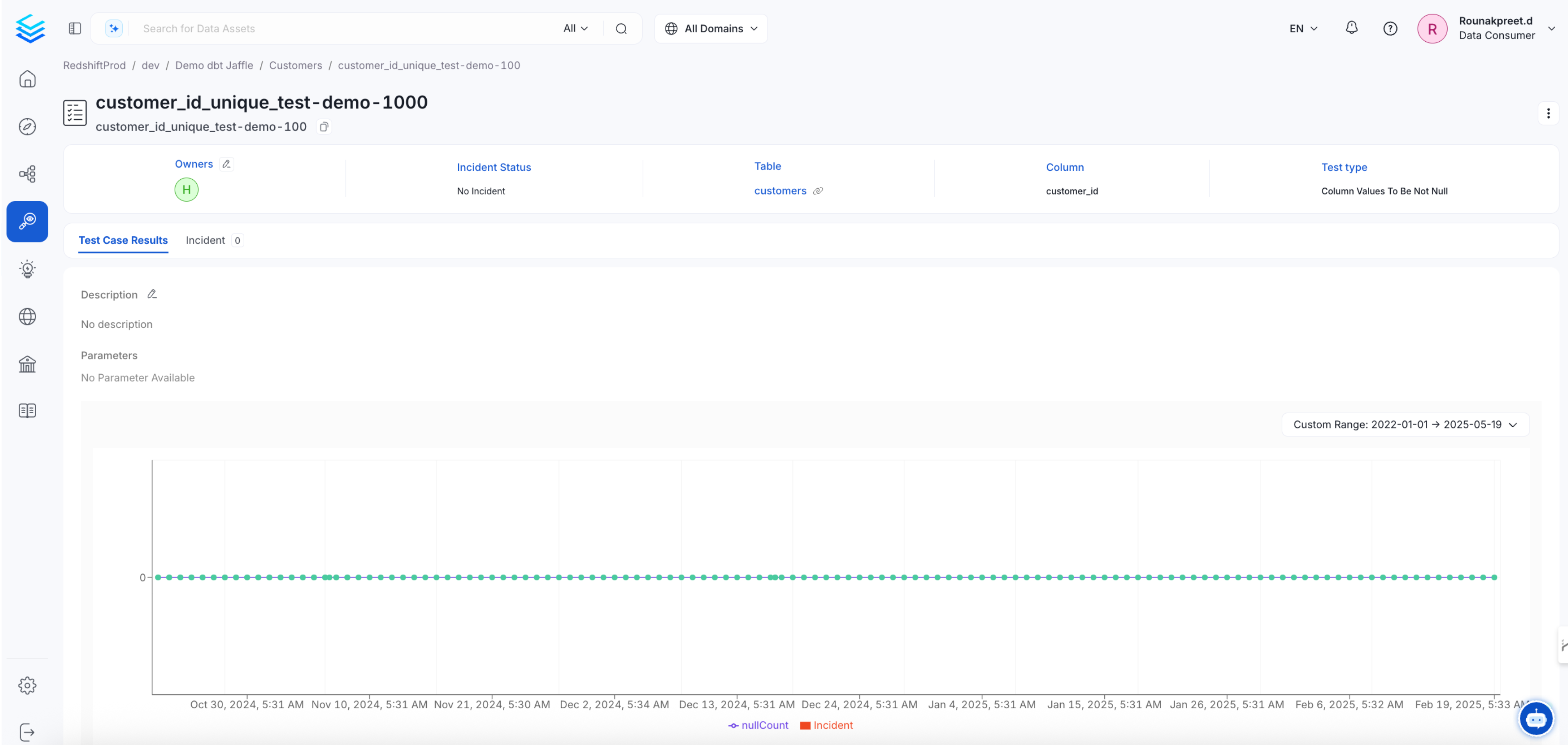Adding Custom Tests
While OpenMetadata provides out of the box tests, you may want to write your test results from your own custom quality test suite or define your own data quality tests to be ran inside OpenMetadata. This is very easy to do using the API and our Python SDK.
Step 1: Creating a TestDefinition
First, you'll need to create a Test Definition for your test. You can use the following endpoint /api/v1/dataQuality/testDefinition using a POST protocol to create your Test Definition. You will need to pass the following data in the body your request at minimum.
Here is a complete CURL request
Make sure to keep the UUID from the response as you will need it to create the Test Case.
Important: If you want to have the test definition available through OpenMetadata UI, testPlatforms need to include OpenMetadata. It will also require extra work that we'll cover below in Step 5. If you are just looking to create new test definition executable through OpenMetadata UI, you can skip ahead to Step 5.
Step 2: Creating a TestSuite
You'll also need to create a Test Suite for your Test Case -- note that you can also use an existing one if you want to. You can use the following endpoint /api/v1/dataQuality/testSuites/executable using a POST protocol to create your Test Definition. You will need to pass the following data in the body your request at minimum.
Here is a complete CURL request
Make sure to keep the UUID from the response as you will need it to create the Test Case.
Step 3: Creating a TestCase
Once you have your Test Definition created you can create a Test Case -- which is a specification of your Test Definition. You can use the following endpoint /api/v1/dataQuality/testCases using a POST protocol to create your Test Case. You will need to pass the following data in the body your request at minimum.
Important: for entityLink make sure to include the starting and ending <>
Here is a complete CURL request
Make sure to keep the UUID from the response as you will need it to create the Test Case.
Step 4: Writing TestCaseResults (Optional - if not executing test case through OpenMetadata UI)
Once you have your Test Case created you can write your results to it. You can use the following endpoint /api/v1/dataQuality/testCases/{test FQN}/testCaseResult using a PUT protocol to add Test Case Results. You will need to pass the following data in the body your request at minimum.
Here is a complete CURL request
You will now be able to see your test in the Test Suite or the table entity.
Step 5: Making Custom Test Case Available Through OpenMetadata UI (Optional)
OpenMetadata offers the flexibility to user to create custom test cases that will be executable through the user interface. To accomplish our goal, we'll be leveraging OpenMetadata namespace data_quality submodule .
A. Create Your Namespace Package
The first in creating your own executable test case is to create a package where you'll be writing the logic to process the tests. Your package should have a minimum the below structure
To add table and column level test cases to SQLAlchemy sources you will place your test respectively in:
metadata/data_quality/validations/table/sqlalchemy/<yourTest>.pymetadata/data_quality/validations/column/sqlalchemy/<yourTest>.py
<yourTest> should match the name of your test definition in Step 1.
Important: You will need to add an __init__.py file in every folder and these __init__.py should have the below line
B. Create your Test Class
Once you have created the different, you can add the logic in your <yourTest>.py file. You will need to create a class named <YourTest>Validator that will inherit from BaseTestValidator. If you need to, you can also inherit from SQAValidatorMixin -- this will give you access to additional methods out of the box. Once completed, you will simply need to implement the run_validation class. This method should return a TestCaseResult object. You can find a full implementation here where we create an entropy test.
C. pip Install Your Package
Once you have completed A) and B) you should only need to pip install your package in the environment where openmetadata python SDK is install.

Create test case

Create test case